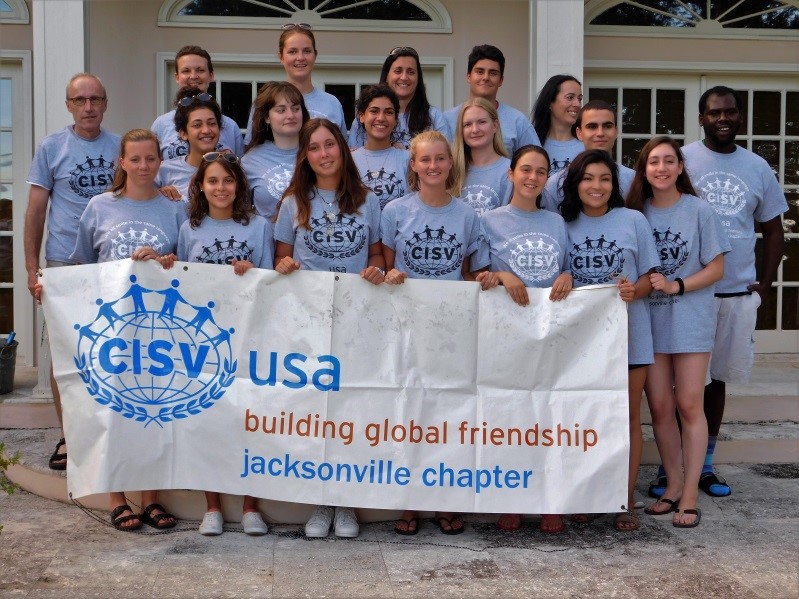
UPDATE August 2, 2016: Week 2 Wrap-Up
The second week of our International People’s Project was a rousing success! The participants:
- removed invasive plants from dunes in Guana Tolomato Matanzas National Estuarine Research Reserve
- sampled microgreens and learned about aquaponics at Gyo Greens
- assembled 3,000 meals at Feeding Northeast Florida
- issued LED lightbulbs and energy audit kits to Jacksonville Northside residents with the Green Team Project
- cleaned up Rethreaded facility for its 5th birthday party
- volunteered at Teacher Supply Depot, which gives free school supplies to DCPS teachers
- pruned trees at Camp Milton Historic Preserve
- learned about civilian life during the Civil War from a reenactor, heard tall tales
- biked the Jacksonville Baldwin Rail Trail
At the Farewell Party, participants shared moving stories about their experience working on these different projects. Click here to see the article in Saturday’s Times-Union.
Thanks again to all who helped with airport rides, camp set-up, meals, and events. We will still accept donations toward food and transportation costs–click here to donate.
UPDATE July 26, 2016: Coming Up this Week & Events
Our International People’s Project is off to a great start. Our 19 volunteers from Europe, Egypt, Ecuador and the USA have sampled soil and water in the Timucuan Preserve for microplastics, visited a mitigation bank near St. Augustine, removed invasive plants and toured the Jacksonville Zoo & Gardens, built a bioswale on the S-Line trail in Springfield and enjoyed meals with CISV chapter members. Click here to learn more about the microplastics.
This week the group will volunteer at Guana Preserve, Re-threaded, Green Team Project, Teachers Supply Depot and Jacksonville Baldwin Rail Trail.
We are so grateful to all of you who have volunteered to make this IPP a success.
July 14, 2016: International Volunteer Citizen Scientists Team Up With Timucuan Preserve Partners (from Timucuan Preserve Media Release)
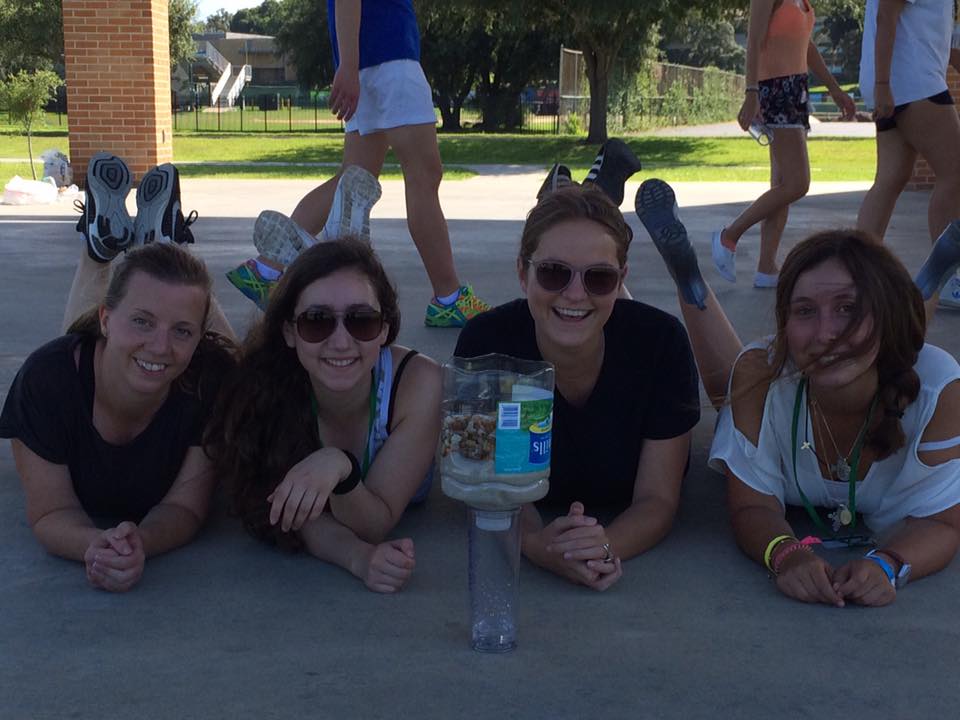
Tiny plastic particles (called microplastics by scientists) are invading our coastal environment as well as the world’s oceans.
The Jacksonville chapter of CISV, a global organization that educates and inspires action for a more just and peaceful world has brought a group of 19 volunteers from 10 countries to assist the following agencies to conduct a microplastics study:
- National Park Service
- St. Johns Riverkeeper
- Timucuan Parks Foundation
- Northeast Florida Aquatic Preserves
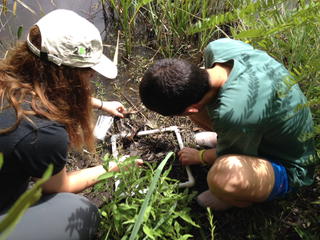

The group will collect sediment and water samples from in and around the Timucuan Preserve and then analyze the samples at the Jacksonville University Marine Science Research Institute to determine the presence of microplastics.
The experience will provide members of the group with new skills as well as an awareness of how we all impact our precious natural resources.
At the same time, they will be helping local scientists get a better idea of where microplastics are affecting our waterways and coastal areas.
Scientists have recognized that most plastics enter the ocean from the land. Much of the plastic is from things we all use on a daily basis. Plastic cups and soda bottles are what most of us may think of, but there are many surprising sources as well. Some personal care items such as body washes, facial scrubs and even toothpaste contain microbeads.
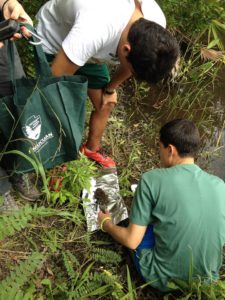
Dr. Maia McGuire, a Florida Sea Grant Extension agent explains the Florida Microplastics Awareness Project (FMAP). “It is a citizen scientist project that was funded in 2015 by an outreach and education grant from NOAA’s Marine Debris Program.
The goal is to bring awareness, education and opportunity for volunteers to collect coastal water samples, filter them and look for microplastics. The idea is to demonstrate to members of our community how plastics never biodegrade—they just break down into smaller and smaller pieces. These microplastics are then accidentally eaten by marine life, threatening their health.”
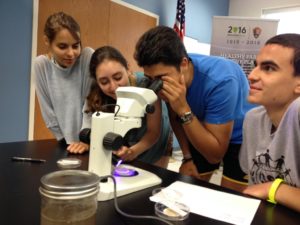
Data collected by CISV volunteers will be put into the FMAP database as well as help the National Park Service manage resources. Staff of the Timucuan Preserve, the Riverkeeper and other partners will help spread the word about how everyone can help manage this pollutant in many ways, from choosing the products they buy and use, to becoming hands-on citizen scientists.

Superintendent of the Timucuan Preserve, Chris Hughes expressed his appreciation for this team effort and desire to expand citizen science efforts in the Timucuan Preserve and the Jacksonville community.
“It is my hope that an effort like this is the beginning of a community effort, by our local citizens, to become aware of this growing environmental issue. Microplastics in the environment is an issue that our neighbors as citizen scientists can help us understand and hence develop strategies to protect the valuable natural and recreational resources of the Timucuan Preserve and the Jacksonville community as a whole.”
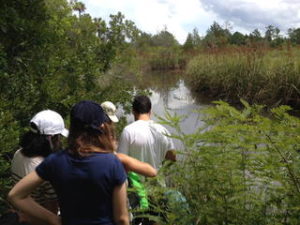
Lisa Taylor of CISV Jacksonville Chapter echoes those same sentiments, adding: “this is a win-win situation for the local CISV chapter international volunteers and the National Park Service.”
Meaningful learning experiences are provided to the CISV citizen scientists while at the same time making important contributions to the scientific efforts of scientists and the National Park Service missions to protect Timucuan Preserve and northeast Florida waterways and coastal natural resources we all enjoy. Our international volunteers will be in Jacksonville for 18 days exploring issues related to sustainable development and are excited to begin with this project.”
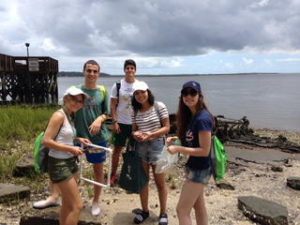
About CISV Jacksonville
Founded in 1950, CISV (www.cisv.org) is a global organization that educates and inspires action for a more just and peaceful world through international educational programs, primarily for youth. CISV has 1 program targeted at adults called International Peoples Project or IPP. These are 2-3 week volunteer projects where adults (age 19+) can work on a community project organized by the local CISV Chapter. These volunteers helping with this microplastics study are participating in CISV Jacksonville’s IPP, the only IPP being held in the USA this year. The Jacksonville Chapter of CISV (www.jacksonville.cisvusa.org) was founded in 1976 and each summer sends about 50 Jacksonville youth to international camps and programs and hosts an international program here in Jacksonville.
About Timucuan Ecological and Historic Preserve
The Timucuan Ecological and Historic Preserve is Jacksonville’s National Park. With many sites to choose from, you can find a great place to relax or learn. Visitor centers are located at Fort Caroline National Memorial, Kingsley Plantation, and the Ribault Club. There are many places to explore. For more ideas call 904.641.7155 or visit our National Park Service website at http://www.nps.gov/timu

